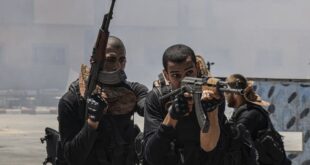BAGHDAD (Reuters) — Al Qaeda in Iraq vowed on Sunday to carry out attacks to “shake the enemy” after the killing of its leader Abu Mussab Zarqawi, heightening fears his death will bring no respite from carnage.
The group said in an Internet statement its leading body met after Zarqawi’s death to discuss strategy and renew a pledge to Al Qaeda leader Osama Ben Laden.
“We plan large-scaled operations that will shake the enemy and rob them of sleep, in coordination with the other factions of the mujahedeen council,” the statement said.
Iraqi leaders and their closest ally US President George W. Bush hailed Zarqawi’s death in a US air strike on Wednesday as a major victory in the battle against “terrorism.”
But no one expects violence to ease dramatically: A car bomb killed six people and wounded 42 in Baghdad just hours after the statement was published, police said.
Sunni Arab insurgents and Al Qaeda militants are waging a campaign of bombings and shootings to topple the Shiite-led government backed by Washington.
The commander of US troops in Iraq predicted in an interview with CBS television on Sunday a gradual reduction of the 131,000 US forces there if the new Iraqi unity government held together and the Iraqi army improved.
Army General George Casey said a growing number of Iraqi army units were capable of leading the battle against the insurgency with US logistical support and he expected almost all of them to develop the capability by the end of this year.
“As long as the Iraqi security forces continue to progress and as long as this national unity government continues to operate that way and move the country forward, I think we’re to be able to see continued gradual reduction of coalition forces over the coming months and into next year,” Casey said.
Insurgents killed four Iraqi soldiers during an attack on a desert Iraqi army base in rebellious Anbar province on Sunday and police found the beheaded body of an Iraqi soldier in a river near Tikrit.
A roadside bomb in northern Baghdad also seriously wounded a senior police officer. A policeman driving the car was killed and another was wounded.
Reconciliation hopes
New Prime Minister Nuri Maliki hopes his national unity government of Shiites, Kurds and Arab Sunnis will end the attacks and tackle the sectarian violence that has pushed the country close to civil war.
He said last week that more than 2,000 detainees would be released from US military and Iraqi prisons to try to help promote national reconciliation. A second group of prisoners was freed on Sunday after nearly 600 were released last week.
Some holding copies of the Koran and prayer rugs, more than 150 prisoners emerged from Abu Ghraib prison outside Baghdad into the blistering sun.
“I went to a funeral and I ended up here,” said Awad Jassim Mohammad, a man in his 60s, who said he was arrested on June 30, 2004, on suspicion of attacking US forces. Abu Ghraib is the site of a US prisoner abuse scandal in 2004.
Most detainees are from the Sunni community, once dominant under Saddam Hussein and now the backbone of the insurgency.
Maliki’s Shiite-led government hopes to draw Sunnis into peaceful politics.
But he faces the sensitive task of disbanding powerful militias tied to leading political parties, including ones in his own ruling Shiite Alliance.
He has vowed to merge militias with security forces, warning of civil war if weapons remain in the hands of militias. But Iraq’s intelligence chief warned against such a move, saying it would give militias official cover to pursue their own agendas.
US military spokesman Major General William Caldwell has said that raids carried out after US warplanes killed Zarqawi had produced a “treasure trove” of intelligence.
And National Security Adviser Mowaffak Rubaie told CNN on Sunday Iraqi security forces had infiltrated Al Qaeda, saying: “We have managed to infiltrate this terrorist organisation and we got quite a few, not only Zarqawi, but others now.” “We found diaries, telephone numbers, computers, we found a database in that computer. There was a lot of information Zarqawi used to carry with him,” he said.
 Eurasia Press & News
Eurasia Press & News
